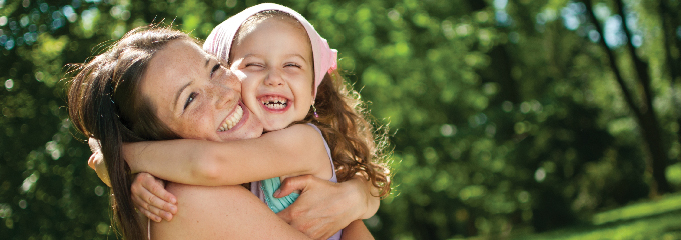
Mindfulness for Parents 2: Mindful Presence

This article was authored by Lynne Kennedy, Senior Training Consultant,
Parenting Education and Support Program, at the Australian Childhood Foundation.
In the Bringing Up Great Kids Parenting Program (BUGK) we teach the skills of mindfulness awareness to parents because research tells us that when parents practice mindfulness all sorts of great things happen at home! Some examples of these are that kids fight less and the household is calmer. But most importantly we know that when parents practice mindfulness regularly they strengthen their prefrontal cortex, which puts them in a more reflective space – giving them the opportunity to make a much more reflective rather than reactive response. Therefore of course, the risk of harm to a child is reduced.
We all know that parenting is an intense mix of happiness, play, frustration, tenderness worry, fun , stress, chaos and more … described by Jon Kabat-Zinn as “The Full Catastrophe of Parenting.” Creating moments of stillness to reconnect with ourselves and reflect on our parenting can be a challenge, but can also be hugely rewarding as we negotiate this parenting adventure. Parenting mindfully is not about somehow becoming the ‘perfect parent,’ but rather becoming present in our parenting – with all its imperfections. Doing so regularly will benefit our children as well as ourselves, increasing our ability to be attentive in our interactions with them.
In previous posts (Mindfulness for Parents 10 Breaths, Stop pause play, Mindful Listening), the Parenting Team have shared other mindful activities we use with parents. Today we would like to share a practice that we use to encourage parents to become more present with their children.
Choose a daily interaction that you have with your child – brushing teeth, bath time, walking to school, bedtime stories, homework etc.
Set your intention to try and be fully present during this interaction every day for a week.

Do this by bringing all of your awareness, as best you can, to your interaction with your child and become fully absorbed in the activity with them. When your mind starts to wander to other things (which it will!) like work, planning for dinner, preparing for the next day, making to-do lists etc. see if you can just let those thoughts go; and come back to being completely present with your child. Remind yourself that you have the rest of the day/evening to think about and sort these other things out but you just have these moments with your child.
After you have focussed on this particular activity for a week of the activity you may like to reflect on the following 3 questions:
- How has this experience been different from how I previously went about this activity?
- What did I notice about my mind’s habit to wander off when I was trying to remain present with my child?
- Has this practice made a difference in how I relate to my child? If so, how?
These daily activities are usually approached as tasks that need to be done so that we can ‘get on with the rest of our day or evening.’ And yet it is they make up most of our interactions with our children. They offer us limitless possibilities for connection that we could miss if we are just physically going through the motions. The tedious and tiresome can be transformed into “precious moments” not to be missed with a little intention.
As one dad who had been practising a range of mindful activities in a BUGK Group observed, “nothing has really changed – everything is still the same at home, but it is different”
And another parent observed “how come I have been coming to this group and now my kids are behaving better!”
Mindful awareness practices nurture a basic ability that we have- the ability to be fully present, attending to what’s happening in the moment, deeply engaged and yet at peace. We hope that you might find them as beneficial in your work as we do.
